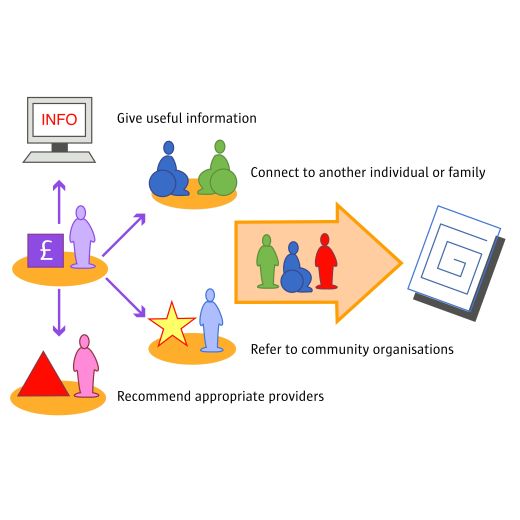The best support assumes and supports capacity and only provides more professionalised expertise where necessary.
Community Brokerage is a system which does not start with the assumption that people always need professional support in order to achieve good lives or to take control over their own support. Instead Community Brokerage starts with a presumption of competence and identifies a broad range of approaches to enable people and families to be stronger.

Individualised funding, since its inception, has often involved attempts to define exactly how people should be supported to take control of their funding. There have been those who think social workers are always the right people, those who think it should only be disabled people or Centres for Independent Living and those who think it should be some kind of independent broker. Simon Duffy and Kate Fulton have argued that all such attempts to limit the options available to people is wrong and is based on prejudice not evidence.
We have found that citizens, controlling their own support, can make better decisions and achieve improved outcomes. So it is important that we do not undermine the ability of citizens to take charge of their own support by making them unduly dependent upon the support of brokers, care managers or other professionals. We have also found that good support can come from all sources: social workers, families, services providers and community organisations. So it is important that no group is ruled out and no group takes on a monopoly role in providing brokerage. We need systems which are empowering, open and capable of constant innovation and improvement.
Community Brokerage:
Citizens, controlling their own support, make better decisions and achieve improved outcomes. So it is important that we do not undermine the ability of citizens to take charge of their own support by making them unduly dependent upon the support of brokers, care managers or other professionals. In addition, for those who need support that support can come from all sources: social workers, families, services providers and community organisations. So it is important that no group is ruled out and no group takes on a monopoly role in providing brokerage or any other kind of support.
Many different people and organisations are capable of providing some or all of these different support functions. Moreover most of these people and organisations are already available, and often funded, within the community now. It is important that we do not ignore existing strengths and community assets. We must invest in our communities and make best use of current investments, energy and capacity.
This does not mean that every different form of support is the same. Partly the quality of the support will be shaped by individual and local factors - the particular people involved, organisational culture or the strength of local communities. However it is also possible to identify some more general properties or tendencies which may make some forms of support better in different circumstances.
| Citizens & Families Using: | Possible Strengths: | Possible Weaknesses: |
| Information Networks | Knowlege of individual Strengthens capacity Building on natural connections | Subjectivity possible Not available to all |
| Peer Support | Individual perspective Credibility and understanding Promoting capacity Real local connections | Subjectivity possible Networks currently poor |
| Community Organisations | Knowledge of community Mainstream funding Objectivity | Support may be tightly rationed |
| Service Providers | Incentive to deliver Knowledge of services | Self-interest |
| Professional Advisors | Objectivity Expertise | Higher cost Low community awareness Low commitment Fostering of dependency |
The publisher is The Centre for Welfare Reform.
Community Brokerage © Simon Duffy & Kate Fulton 2011.
All Rights Reserved. No part of this paper may be reproduced in any form without permission from the publisher except for the quotation of brief passages in reviews.
community, local government, Inspiration